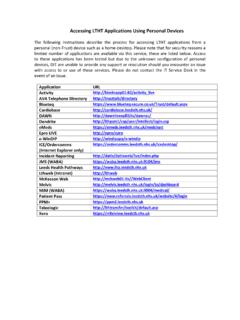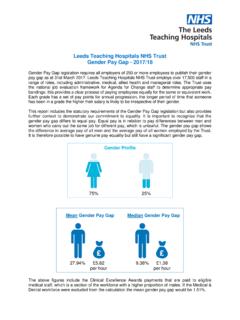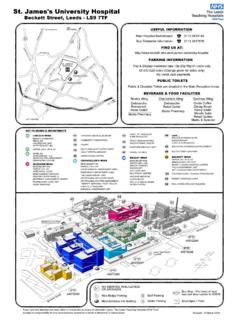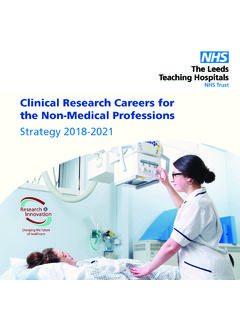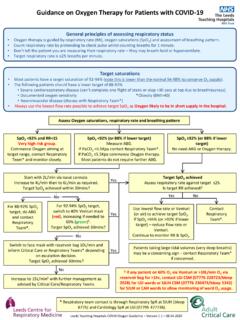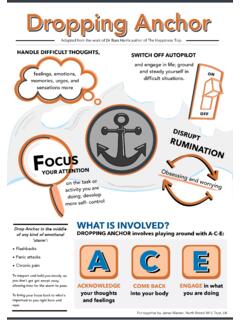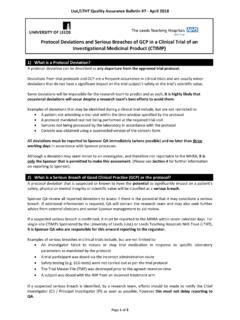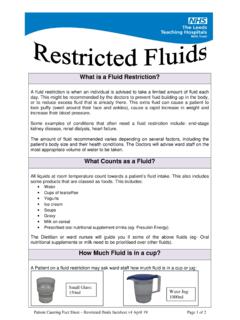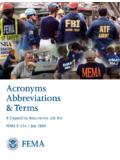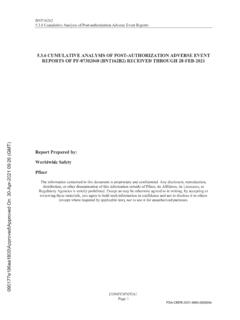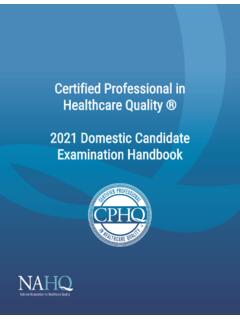Transcription of ACGS Best Practice Guidelines for Variant Classification 2019
1 Copyright ACGS 2019 Page 1 ACGS Best Practice Guidelines for Variant Classification 2019 Sian Ellard1,2, Emma L Baple2,3,4, Ian Berry5, Natalie Forrester6, Clare Turnbull4, Martina Owens1, Diana M Eccles7, Stephen Abbs8, Richard Scott4,9, Zandra C Deans10, Tracy Lester11, Jo Campbell12, William G Newman13,14 and Dominic J McMullan15 1. Department of Molecular Genetics, Royal Devon & Exeter NHS Foundation Trust, Exeter, EX2 5DW, UK. 2. University of Exeter Medical School, Exeter, EX2 5DW, UK. 3. Department of Clinical Genetics, Royal Devon & Exeter NHS Foundation Trust, Exeter, EX2 5DW, UK. 4. Genomics England, William Harvey Research Institute, Queen Mary University of London, Charterhouse Square, London, EC1M 6BQ, UK 5. Leeds Genetics Laboratory, St James s University Hospital, Leeds LS9 7TF, UK.
2 6. Bristol Genetics Laboratory, North Bristol NHS Trust, Bristol BS10 5NB, UK. 7. Wessex Clinical Genetics Service, University Hospital Southampton, Southampton SO16 5YA, UK. 8. East Anglian Medical Genetics Service, Addenbrooke s Hospital, Cambridge CB2 0QQ, UK. 9. Department of Clinical Genetics, Great Ormond Street Hospital for Children NHS Foundation Trust, London, WC1N 3JH, UK. 10. UK NEQAS for Molecular Genetics, Department of Laboratory Medicine, Royal infirmary of Edinburgh, Edinburgh EH16 4SA, UK. 11. Oxford Genetic Laboratories, Oxford University Hospitals NHS Foundation Trust, Oxford OX3 7LE, UK. 12. Viapath Genetics Laboratory, Viapath Analytics LLP, 5th Floor Tower Wing, Guy s Hospital, London SE1 9RT, UK. 13. Manchester Centre for Genomic Medicine, Central Manchester University Hospitals NHS Foundation Trust, Manchester M13 9WL, UK.
3 14. Evolution and Genomic Science, University of Manchester, Manchester M13 9PL 15. West Midlands Regional Genetics Laboratory, Birmingham Women s NHS Foundation Trust, Birmingham, B15 2TG, UK. Recommendations ratified by ACGS Quality Subcommittee on 06 05 2019 1. Introduction In the European Union, a rare disease is defined as rare when it affects less than one in 2000 individuals. Approximately seven thousand rare diseases have been described which in total affect an estimated 1 in 17 of the UK population (approximately million individuals). Nearly 5000 of these rare diseases are monogenic disorders caused by highly penetrant variants in a single gene. A molecular genetic diagnosis of a rare disease requires the identification of a single disease-causing Variant (or bi-allelic variants in autosomal recessive conditions).
4 A prompt and accurate molecular diagnosis can be crucial to the delivery of optimal care for a patient and their family particularly increasingly in targeting treatment (Saunders et al 2012). However, diagnosis of a rare genetic disease can be a challenge and is contingent upon a robust understanding of the molecular aetiology of the disease. A molecular genetic diagnosis underpins robust disease Classification , provision of prognostic information, accurate risk prediction for relatives, and importantly can indicate the most appropriate treatment(s), inform access to clinical screening, prevention strategies or clinical trials and facilitate access to support services and patient-led support groups. Historically, genetic testing focused on the analysis of one or a small number of genes indicated by the patient s phenotype, but the advent of next generation sequencing technology has revolutionised the scale at which genetic testing can be performed enabling the analysis of many more genes within the same assay.
5 Large gene panel tests (>100 genes) and whole exome sequencing are routinely available in UK clinical diagnostic laboratories and whole genome sequencing, first available through the 100,000 Genomes Copyright ACGS 2019 Page 2 Project in England, will be commissioned for mainstream clinical care within the NHS in England in the near future. Deciphering which, if any, of the observed variants are disease-causing is challenging as each human genome has 3-4 million variants (compared to the reference human genome sequence). Only a minority are causative of monogenic disease; most are part of normal human variation or may contribute to an increased or decreased risk of multi-factorial disease. The gnomAD database ( ) currently includes million variants identified by exome sequencing of 125, 748 individuals and million variants identified through genome sequencing of 15,708 individuals who were part of various disease-specific and population genetic studies, (Karczewski et al BioRxiv 2019 ), but we do not yet have a comprehensive catalogue of global genetic variation.
6 The focus of these Guidelines is the Classification of highly penetrant protein-coding variants. Inferring pathogenicity of non-coding variants is more complex, but will need to be addressed as a standard of Practice in the future. In 2015 the American College of Medical Genetics and Genomics (ACMG) and the Association for Molecular Pathology (AMP) published standards and Guidelines for the interpretation of sequence variants (Richards et al Genetics in Medicine 2015). These Guidelines describe a framework for classifying variants as pathogenic , likely pathogenic , uncertain significance , likely benign or benign according to a series of criteria with levels of evidence defined as very strong, strong, moderate or supporting.
7 They recommend that all assertions should be classified with respect to a disease and inheritance pattern. The Guidelines also state that a Variant of uncertain significance should not be used in clinical decision making. The consequences of a mis-diagnosis can be harmful not just for the proband but also their relatives whose clinical management is altered as a consequence of cascade testing. Further development of the ACMG/AMP Guidelines is being undertaken through the US ClinGen Sequence Variant Interpretation (SVI) Working Group ( ). Their goal is to support the refinement and evolution of the Guidelines . It was recognised by Richards et al (2015) that more focused guidance regarding the Classification of variants in specific genes is required given that the applicability and weight assigned to certain criteria may vary by disease and gene.
8 A number of disease-specific Variant expert panels have been established and are generating disease/gene specific Guidelines (see Kelly et al 2018 for MYH7-specific Guidelines ). Work is also underway to consider interpretation and reporting of variants with reduced penetrance. High quality, accurate Variant interpretation requires scientific knowledge of the gene structure, function, previously identified variants and disease mechanism in addition to comprehensive clinical knowledge of the patient and their families medical history. The UK s National Health Service (NHS) provides a unique opportunity to integrate curated genotype and phenotype information within a nationally developed database. On 4th November 2016 a group of NHS clinical scientists and clinical geneticists met to discuss the implementation of the ACMG Guidelines within the UK (see workshop report from the PHG Foundation).
9 A consensus statement was issued on 11th November 2016 by the Association for Clinical Genomic Science (see ACGS consensus statement or Appendix 1). It recommended Copyright ACGS 2019 Page 3 adoption of the ACMG Guidelines for germline Variant Classification and interpretation in UK diagnostic genetic laboratories performing testing for rare disease and familial cancers. A Train the Trainers workshop was held in February 2017 and attended by representatives from 24 regional genetics centres across England, Scotland, Wales and Ireland. The aim of the workshop was to plan the implementation of the ACMG Guidelines in a co-ordinated way in order to achieve accurate usage and hence consistent use of the Guidelines across and within laboratories.
10 Monthly WebEx meetings for rare disease and familial cancer predisposition were established in 2017 to facilitate Variant interpretation for SNVs and indels through multi-disciplinary case-based discussion and provide an opportunity for reviewing updates to the Guidelines . Please note that these Guidelines are intended for general use in classifying variants in patients with rare diseases. Disease-specific Guidelines are being developed for disorders where different evidence thresholds are required, for example familial cancer predisposition and inherited cardiac conditions. 2. Integration of clinical and scientific data in Variant Classification Interpretation of a Variant for use in clinical decision making requires comprehensive knowledge of the patient s phenotype, mode of inheritance for the disease gene, mutational mechanism ( haploinsufficiency, dominant negative), protein structure/function and the strength of the gene-disease relationship (Strande et al Am J Hum Genet 2017).
